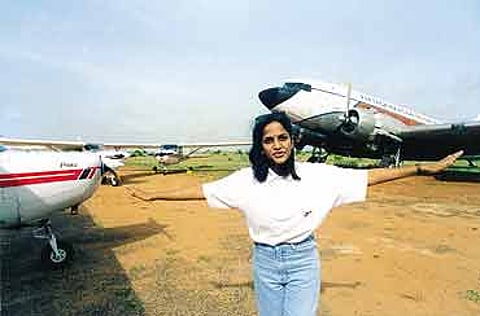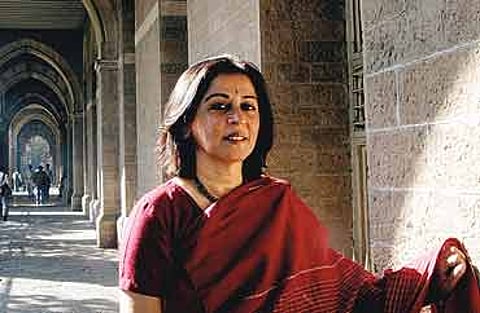She's Got Other Ideas
It's not their spunk or success, but the range of their offbeat choices that will surprise you

- After years of research, this December Alka Zadgaonkar, a 40-year-old organic chemistry professor in Nagpur, will finally begin commercial production of 25,000 litres of fuel a day from plastic wastes. She has received a patent from the World Intellectual Property Organisation and the product and process have also been certified by the Indian Oil Corporation. She had to invest nearly Rs 2 crore into R&D but when the plant goes on-stream, it will have a turnover of nearly Rs 5 lakh a day.
- Trained at a catering college, Mumbai-based Shatbhi Basu has been an F&B manager, an advertising executive handling food accounts, even a cocktail columnist. Eventually, she decided to concentrate on what she loved most: mixing drinks. Now she runs her own bartending academy and holds an annual bartending competition. She also takes up consultancy projects to set up bars, works out bar themes and cocktails. "It's a small enterprise...we barely do a few lakhs every year, but it's mine, something I love doing," she says.
- Thirty-five-year-old Mehr Sarid wanted to combine her passion for design with her experience in the hotel and hospitality business. She set up a one-stop shop for weddings called The Wedding Art that manages everything for the D-day, from the flowers to mehndi, bands and pandals right down to the food.
- Brinda Somaya, 56-year-old Mumbai-based architect, set up her practice, Somaya and Kalappa, in 1978 with her sister Ranjini Kalappa. They started off working from home and now Somaya has three offices and over 50 professionals working for her. A major portion of her practice is new work—she has done state-of-the-art IT campuses and corporate buildings, but she has a special passion for conservation. "Every architect has to be sensitive to what has gone before," she says. She has restored the West End Hotel in Bangalore, the Cathedral School and St Thomas Cathedral in Mumbai.
At first glance what these women seem to share is their proclivity to take risks. But look closely and you'll find that their sense of adventure is actually backed by foresight and a sound business sense. After getting her licence, Mamatha could have chosen the obvious safe option, joining an airline. "I would have been drawing Rs 3 lakh a month," she says. But she saw potential in a flying school. "In the early '90s, at least a hundred people from Hyderabad were going to the flying schools in the US. I knew that if I could tap at least 25 per cent of them, I would have a good business in hand," she says.

Captain Mamatha: Flytech Aviation Academy has Rs 2 cr turnover, 300 students, 60 staffers
Similarly, with a degree from IIM Calcutta and experience in the garment trade behind her, Latika Khaneja took a plunge into the fairly new discipline of celebrity management. She just had a few potential cricket stars in hand, like Virender Sehwag, Ashish Nehra, Dinesh Mongia, Amit Bhandari and Gautam Gambhir. She remembers how Sehwag was offered a Rs 12 lakh contract by a website. "He was quite kicked about the offer. 'Meri Maruti aa jaayegi', he used to say. But we asked him to wait, made an attractive brochure for him. In November 2001, he got a century in South Africa. A month later, we signed up Coke," she recollects. Four years later, despite the country's cricket obsession, she took on the job of marketing Olympic silver medalist shooter Rajyavardhan Rathore, getting him contracts with Hero Honda, Sahara and Coke.
Shikha Sharma took the risk of giving up a secure career in medicine to become a nutritional expert. She was a junior resident in the cardiology department when she found a patient returning to the ICU with heart trouble, all because his diet wasn't kosher. She got intrigued by the science of weight and health management and eventually started her own nutritional advisory clinics. "I wanted to treat health as a serious business, hiring dieticians, creating recipes and databases and prescribing diets systematically," she says. She now gets 800-1,000 people a month for consultation at her five centres in Delhi.

Shatbhi Basu: Runs bartending school Stir Academy, also does consultancy projects to set up bars
Similarly, for Preeti Vyas Giannetti, who pioneered publication design, did graphics for films, directed music videos and designed CD-ROMs, it was almost a professional peril to launch Vyas Giannetti Creative. "I became an entrepreneur, a woman entrepreneur from a creative background (no degree in business management) at a time when the advertising industry was having its most difficult moments," she says. She launched VGC in 1997 with one computer and one employee in a Versova loft in Mumbai. Now she has over 60 people between Delhi and Mumbai offices. VGC is a brand communications agency with a capitalised billing of around $12 million (Rs 50 crore-plus) and is amongst the top 25 advertising agencies in the Economic Times ratings 2005.

Mehr Sarid: The Wedding Art ‘managed’ 74 weddings last year
Right from a high-flying CEO of a company to friendly neighbourhood beauty parlour or boutique owners, the business women have something else in common—resourcefulness and an ability to spot opportunities where none seem to exist. Sushma Puri returned home from London after 17 years to find that models were being represented by small, unstructured, fly-by-night operators. She took up the India franchise of Elite Model Management. Today, she has 1,500 clients and 150 models on board and has introduced popular faces like Sonalika Oberoi and Neha Kapur. "What excited me most is how I could change the entire way in which the fashion industry was functioning. I brought the element of focus and seriousness into the modelling business," she says.

Suhag Khemlani: Technoclean employs 700 window cleaners across 17 cities now; turnover: Rs 6 crore
Even women who have inherited their parents' businesses have shown immense initiative and drive to expand on it and give it their personal signature. Take hotelier Priya Paul, who took over the Park Group from her father and successfully repositioned it as a boutique hotel chain. "From three properties, we have grown to five with the sixth coming up in Hyderabad," she says. The group's turnover now stands at Rs 150 crore per year. Similarly, Suhag Khemlani, director at her father's Technoclean, a window cleaning company, professionalised the processes by introducing rope access equipment and training for the employees. Under her guidance, the company has grown to about 700 cleaners spread across 17 cities with a turnover of Rs 6 crore a year.
Ask these ladies about possible gender bias they may have faced on the road to success and most don't make an issue of it. Prejudices were taken in their stride, negotiated smoothly and sternly. Garcha remembers that when she was filling the tender for security guards at Indian Oil Corporation's Durgapur plant, an official told her: "A woman herself needs security, what security will she provide us?" Says she: "I really lost it and gave him a piece of my mind. But I managed to get the contract." Till today, this officer sends her a Diwali card every year.

Sujata Kesavan: Ray + Kesavan is a top graphic design firm; clients include Airtel, Infosys, P&G, Wipro etc
There can be challenges of other kinds too. Take Sujata Kesavan from Bangalore, arguably the topmost graphic designer in the country. As a student, she was deeply interested in science as well as the arts and chose to specialise in design because it combined both fields. But when she came back to India after doing her Masters from Yale there were no design firms around. So she had no choice but to set up her own, Ray+Kesavan. However, despite being on the top of the heap, the lack of understanding about design in India continues to be a problem area for her. "One spends an excessive amount of time convincing clients. There is a mistaken notion that design is expensive, elitist. Indian industry needs to be educated as to how design can be leveraged to offer better products and services to improve the quality of life for all sections of society," she says.
For women. managing the business is all about learning on the job, dealing with failures and frustrations to emerge on top. Just as it is for men. For Ritu Dalmia, whose family runs a marble and granite business, setting up a restaurant, Mezza Luna, in 1993 meant facing "super failure". The expensive, fine-dining restaurant was way too ahead of its times. "It taught me that in business you need to be an inventor rather than an innovator," she says. She then moved to London, started the successful Vama and later came back to start the popular Diva in Delhi which now has a turnover of Rs 4 crore a year. "I didn't go to Harvard or Wharton. My business school was Mezza Luna. The failures taught me how to be focused and capitalise on my strengths," she says.

Latika Khaneja: Collage Sports Management; represents Virender Sehwag, Rajyavardhan Rathore
The game's all about your mindset. It's not so much about being a woman in a man's world but about the love of work itself, about deriving a sense of identity from it. "My work is what I am. I don't see myself separate from my work," says Somaya. What gives Khaneja a high is to see cheques and endorsements flow in for her celebrity clients. "Your end goal is always self-evolution," says Giannetti. And Mamatha loves the fact that she bumps into her own students whichever airport she goes to. "I help build futures, which is very satisfying," she says.
It may mean compromising on that typical happy family situation. Garcha had to stay on in Durgapur for five years, even after her husband got posted out because she didn't want to give up what she was doing. She shuttled every month between Durgapur and Chandigarh when she was shifting her business to Punjab. Zadgaonkar's seven years of continuous research happened mostly after dinner and between family chores. She would teach at the college in the mornings, do R&D work, attend to her share of housework in the joint family, help her son study and then get back to her R&D again. "I managed with two-three hours of sleep," she says. Somaya says she never felt embarrassed about juggling the many roles. "If I had an issue, I would tell my client. I'd say that 'my child is unwell'. Transparency in how you work is very important," she says.

Brinda Somaya: Architect firm Somaya and Kalappa (1978); works in conservation too
Like all good entrepreneurs, none of these ladies are willing to rest on their laurels. Mamatha plans to start a chartered airline service in Andhra Pradesh. Zadgaonkar wants to make high-end refined fuel. VGC's next office is going to be overseas. Sharma intends to start a nutrition training school. Simultaneously, they are also keeping their philanthropic spirit alive. Ray+Kesavan works pro bono for non-profit organisations. Mamatha sponsors the education of the children of her Class IV employees. Somaya has been rehabilitating earthquake-hit villages, has worked in slums and orphanages. The women from the village she rebuilt in Kutch embroidered the sari she wore on her daughter's engagement. "What we get back is much more than what we give," she says. For them, that's when the business truly becomes a profit venture.
Tags